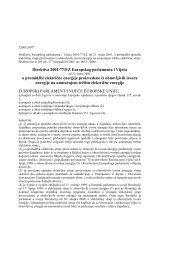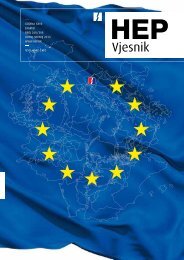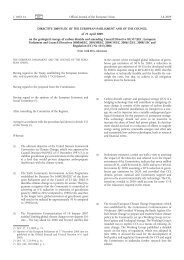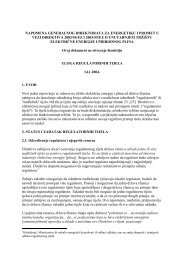You also want an ePaper? Increase the reach of your titles
YUMPU automatically turns print PDFs into web optimized ePapers that Google loves.
1 UVOD<br />
Utvrappleivanje energetske politike, bilo za politiËke<br />
blokove, poput Europske unije (EU), bilo za<br />
pojedine suverene dræave, u pravilu se na cijelom<br />
Zapadu temelji na tri odvojena, ali meappleusobno<br />
povezana zahtjeva. To su: sigurnost opskrbe,<br />
utjecaj na okoliπ i isplativost. Ta tri zahtjeva neÊe<br />
sve vlade poredati po istom redoslijedu vaænosti.<br />
©ira javnost moæda Êe se takoappleer opredijeliti<br />
za redoslijed vaænosti drukËiji od svoje vlade ili<br />
Êe se usmjeriti na samo nekoliko pitanja iz te<br />
problematike. Primjerice, u novijem razmatranju<br />
energetske problematike u ©kotskoj [1] javna<br />
rasprava o buduÊoj opskrbi elektriËnom energijom<br />
bila je skoro potpuno posveÊena pitanju izgradnje<br />
novih nuklearki i πirem koriπtenju obnovljivih<br />
izvora energije. Usprkos novijim naglim pove-<br />
Êanjima cijene uzrokovanima rastom cijene plina,<br />
malo se javne rasprave vodilo o tome, pri Ëemu se<br />
pretpostavljalo da Êe se vlada veÊ nekako pobrinuti<br />
za sigurnost opskrbe.<br />
Kada je rijeË o vladama, navedena tri Ëimbenika<br />
moraju se stalno preispitivati, kao i njihova meappleuovisnost,<br />
o Ëemu kratkoroËno i dugoroËno ovisi<br />
opskrba energijom.<br />
PolitiËke izjave vezane za energetsku politiku<br />
Ëesto su veoma opÊenite i tek su puke smjernice<br />
ili izrazi ambicija, posebice u dræavama gdje<br />
je elektroprivreda u privatnom vlasniπtvu i gdje<br />
je vladina intervencija manje poæeljna. Ipak je<br />
vaæno da politiËke izjave budu dosljedne i da<br />
se izbjegavaju bilo kakvi oËiti obrati u politici,<br />
jer elektroprivreda koja ulaæe u energetsku<br />
infrastrukturu traæi jasnoÊu. Nadalje, njihovi<br />
investicijski horizonti mjere se u desetljeÊima<br />
a ne u godinama, pa takva politika mora biti<br />
dugoroËna.<br />
UnatoË navedenim opÊim naËelima, intervencija<br />
vlade Ëini se nuænom kada doapplee do nepredvidivih<br />
situacija ili kad nastanu nenamjeravane posljedice<br />
i nacionalni interesi postanu ugroæeni.<br />
Intervencije te vrste bit Êe vjerojatnije ondje<br />
gdje se elektroprivreda percipira kao izloæena<br />
silama træiπta. Svaki neuspjeh træiπta da pruæi<br />
πiroki dijapazon politiËkih ciljeva obiËno ima za<br />
posljedicu vladine intervencije iza kojih uvijek ne<br />
slijede oËekivane reakcije sudionika na træiπtu.<br />
U ovom Ëlanku nastoje se opisati novije izjave<br />
EU u svezi s energetskom politikom, uz poseban<br />
osvrt na elektroenergetski sektor. Dalje se opisuju<br />
neke teπkoÊe u provedbi tih smjernica u svjetlu<br />
razliËitih politiËkih ciljeva i specifiËnosti pojedinih<br />
suverenih dræava, postojeÊih vlasniËkih i træiπnih<br />
struktura i izvora primarne energije u svakoj zemlji<br />
1 INTRODUCTION<br />
Throughout the Western world the determination of<br />
energy policy, whether for political blocs like the<br />
European Union (EU) or individual sovereign nations,<br />
is invariably based upon three separate but<br />
interlinked precepts; these are the security of supply,<br />
impact on the environment, and affordability.<br />
Not all governments would arrange these precepts<br />
in the same order of importance. The general public<br />
may also choose a different order of importance<br />
from their government or concentrate on only a few<br />
of the issues. For example, in a recent examination<br />
of energy issues in Scotland [1], the public debate<br />
in regard to future electricity supply was almost<br />
entirely devoted to the consideration of new nuclear<br />
build and widespread use of renewables. Despite<br />
recent sharp price increases due to the rise in gas<br />
prices, little public debate was focused on this and<br />
there was a bland assumption that the security of<br />
energy supply will be ensured by government action.<br />
As far as governments are concerned there must be<br />
a constant re-examination of the three above mentioned<br />
factors and their inter-relationship which<br />
underpin energy supply in both the short and long<br />
term.<br />
Frequently, energy policy statements are extremely<br />
general and may be no more than guidelines or<br />
aspirations, particularly where the industry is<br />
privately owned and government intervention is<br />
less welcome. Nevertheless, it is important that<br />
any policy statements are consistent and avoid<br />
any obvious reversals in policy, since the industry<br />
investing in energy supply infrastructure needs<br />
clarity. Furthermore, their investment horizons are<br />
measured in decades rather than years, so that<br />
policy must be long-term.<br />
Despite the general principles indicated, government<br />
interventions seem inevitable when unforeseen<br />
occurrences take place or unintended consequences<br />
arise and national interests are threatened.<br />
Interventions of this type are more likely to occur<br />
where the industry is perceived to be market driven.<br />
Any failure of the market to deliver broad policy objectives<br />
usually leads to government interventions<br />
which do not always produce the intended reactions<br />
of market participants.<br />
This paper seeks to describe recent energy policy<br />
statements by the EU, with particular reference to<br />
electricity, and goes on to describe some of the difficulties<br />
of implementing these policies in the light<br />
of different political objectives and characteristics<br />
of individual sovereign nations, the existing ownership<br />
and market structures and sources of primary<br />
Kennedy, M. W., StaniÊ, Z., Energetska politika u Europi i..., Energija, god. 56(2007), br. 3., str. 268∑291<br />
Kennedy, M. W., StaniÊ, Z., Energy Policy in Europe and..., Energija, vol. 56(2007), No. 3, pp. 268∑291<br />
270

















